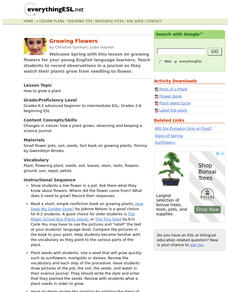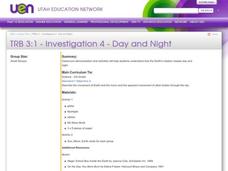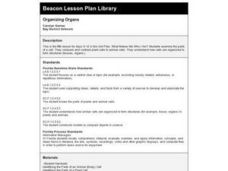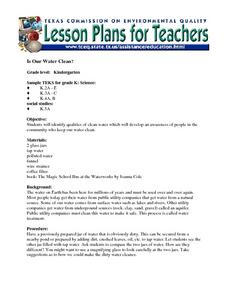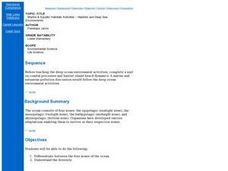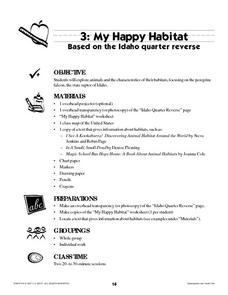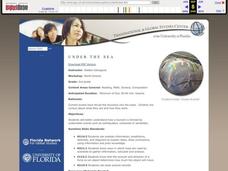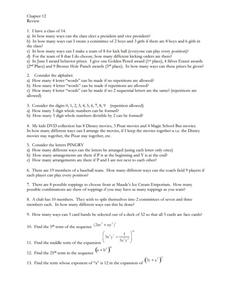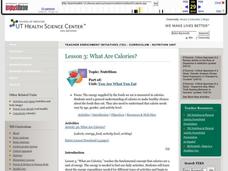Curated OER
Growing Flowers
Students grow flowers from seeds. They plant quick-growing seeds in a flower pot and consider what a seed needs to grow. They observe and record the growth of the planted seeds in science journals.
Curated OER
Finding Out About the Stars and Planets
Young scholars complete a web-based activity to study the planets and solar system. Students complete a number of activities including a slide show that depict the true facts about planets.
Curated OER
Day and Night
Third graders view a classroom simulation that demonstrates how the Earth's rotation creates day and night.
Curated OER
Things Are Heating Up!
Third graders study how heat is produced from mechanical and electrical machines and human activities.
Curated OER
Organizing Organs
Fifth graders research plant and animals cells and create a Venn Diagram to show the similarities and differences.
Curated OER
Sunbeam Dining
Students learn at least two different things that animals eat, then construct a food chain and play a food chain game.
Curated OER
We're Batty
Students watch a video about bats and compare and contrast them to birds. They identify the specific characteristics that identify bats as mammals and what makes them unique from other mammals.
Curated OER
Explosive Ideas!
Students explore the layers of the Earth and the dynamic changes that they cause on Earth's surface. Volcanoes and earthquakes become the focus of the lesson as the Oregon State quarter and its Crater Lake images are linked to the topic.
Curated OER
Is Our Water Clean?
Students identify qualities of clean water and develop an awareness of people in the community who keep our water clean.
Curated OER
Habitats and Deep Sea Environments
Students examine and identify the characteristics of the four zones of the ocean. They discover the amount of diversity in marine habitats. They also explore the adaptations organisms have that have allowed them to survive.
Curated OER
Whose River Is It?
Students explore the world around them through authors, poets, and artists eyes and ears as it relates to them with the river theme. They examine and interpret conditions that might affect the river. Students read books about rivers....
Curated OER
My Happy Habitat
Students observe and discuss the Idaho state quarter to begin an activity in which they define and draw different types of habitats. They discuss the habitats that the migrating Peregrine falcon, which appears on the Idaho quarter,...
Curated OER
Under The Sea
Second graders study how a tsunami is formed by underwater events such as earthquakes, volcanoes or landslides. They discuss what they knew about living and non-living things in the ocean.
Curated OER
Water, Water Everywhere
Students observe and describe ways water is used in their homes and communities. They determine the source of their water. Students determine ways they can save and protect their water.
Curated OER
Rate of Decomposition
Learners experiment with the decomposition rate of garbage. They discover that environments are fragile and need to be protected and resources are not always used wisely. They then think about their own environment and then about the...
Curated OER
I'm Falling For You!
Third graders are introduced to the concept of gravity by observing different objects being dropped from a high point. In groups, they complete the same activities Galileo did and record their observations. To end the lesson, they...
Curated OER
Rainforest Adventures
Students study the vegetation and types of animals that live in the rainforest. They role-play their favorite rainforest animals and write letters from the viewpoint of their favorite animals. After writing their letters, they view a...
Curated OER
Combinations and Sequences
In this combinations review worksheet, students answer 5 multi-step short answer questions involving combinations. Students then answer 15 questions regarding combinations, sequences, and terms. Students also answers 15 probability...
Curated OER
Cave Men to Cave Painting
Students explore the Ice Age. In this geology and social studies lesson, students read the book Eyewitness Books Early Humans and create a KWL chart about the Ice Age. Students locate Asia and North America on the World Map and...
Curated OER
What Are Calories?
Students examine calories for the human body. In this calorie lesson plan, students explore the energy expenditures needed for different types of activities and how many calories are needed to support daily functions.
Curated OER
Nutrition
Students examine nutrition and their own eating habits. For this healthy eating lesson students participate in several activities that include building a food pyramid and analyzing it.
Curated OER
Evaporation in the Water Cycle
Students study the stages of the water cycle and evaporation. For this water cycle lesson, students read Water Cycles and color a diagram of the water cycle. Students review related terms and sing a song about the Water Cycle. Students...
Curated OER
Pump It Up
Young scholars study the anatomy and functions of a heart. For this heart study lesson, students read a book about the heart and study a plaster heart model. Young scholars take their own pulse in various stages of rest as well as active...


